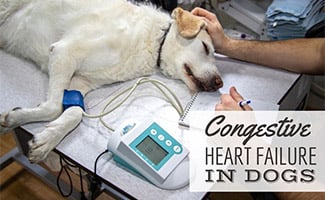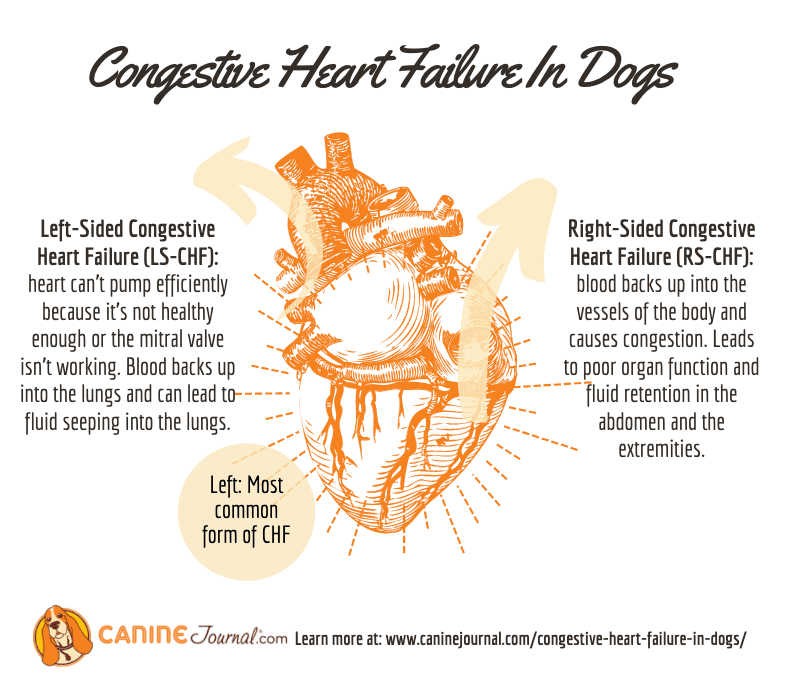Congestive Heart Failure In Dogs
When you purchase through links on our site, we may earn a commission. Here’s how it works.

Did you know heart problems can be just as severe for your dog as they can be for you? Congestive heart failure can leave your pup feeling sluggish and out of breath. Understanding the signs, symptoms and treatment will help you keep your dog as active and comfortable as possible.
Table of Contents
Article Overview
- What Is Congestive Heart Failure (CHF)? (Infographic)
- What Are The Causes?
- Symptoms
- Stages Of Congestive Heart Failure
- Diagnosis And Treatment
- What A Vet Has To Say (Video)
- Ease The Anxiety And Pain Of Congestive Heart Failure
What Is Congestive Heart Failure?
Congestive Heart Failure (CHF) is a chronic illness where the heart is unable to pump a sufficient amount of blood to the body. The heart receives blood from the body, sends it to the lungs to get oxygen and then pumps it out to the body again. If the heart can’t pump properly, blood floods the lungs or heart. There are 2 types of CHF, depending on which side of the heart is affected.
Right-Sided Congestive Heart Failure (RS-CHF)
Right-sided CHF is when the heart is unable to pump blood to the lungs for oxygenation, and the blood leaks through the tricuspid valve from the right atrium to the right ventricle of the heart. The heart can’t pump efficiently because either it’s not healthy enough to pump the blood or the tricuspid valve is’t working correctly. When this occurs, blood backs up into the blood vessels and causes congestion. RS-CHF leads to poor organ function and fluid retention in the abdomen (ascites) and the extremities (peripheral edema).
Left-Sided Congestive Heart Failure (LS-CHF)
Left-sided CHF is when the heart is unable to pump the blood to the blood vessels in the body, and blood leaks through the mitral valve from the left ventricle to the left ventricle of the heart. The heart can’t pump efficiently because either the heart isn’t healthy enough to pump the blood, or the mitral valve isn’t working correctly. When this occurs, blood backs up into the lungs. LS-CHF leads to fluid seeping into the lungs (pulmonary edema) and is the most common form of CHF.

It’s possible to have RS-CHF and LS-CHF at the same time. Any type of CHF causes a lack of oxygen in the tissues and the heart to fail.
What Are The Causes?
Several things can cause CHF in dogs. Sometimes, there’s a congenital heart defect, which means the defect has been there since birth. These defects include leaking heart valves, an enlarged heart, a hole in the heart and blood vessel abnormalities. It’s rare for a dog to have a congenital heart defect. Leaking valves and enlarged hearts can be congenital or develop over time.
Dogs that are born healthy can develop CHF later in life. Some of the things that can cause CHF to develop include viruses like parvovirus, heartworms, bacterial infections and nutritional deficiencies.
Symptoms

Symptoms of CHF include:
- Persistent cough
- Difficulty breathing
- Excessive panting
- Fainting
- Weakness
- Blueish gray gums or tongue
- Swollen abdomen
- Fluid buildup
- Fatigue
- Loss of appetite
- Weight loss
Stages of Congestive Heart Failure
There are 4 stages of CHF:
- Stage 1: In the first stage, the heart’s function is just beginning to decline, and there are rarely signs or symptoms.
- Stage 2: As heart function decreases, symptoms like fatigue and trouble breathing are common after exertion.
- Stage 3: In this stage, symptoms become more apparent even after short stints of activity. The fluid will begin to accumulate, and you may see pulmonary or peripheral edema.
- Stage 4: This is the final stage of CHF. You’ll notice your dog has trouble breathing, even during rest, and edema becomes very apparent. They may have difficulty walking and experience loss of appetite and vomiting.
The life expectancy of a dog with CHF can vary. With early diagnosis and treatment, many dogs go on to live healthy, normal lives.
Diagnosis And Treatment
You’ll need to see your veterinarian for a diagnosis. For them to give you a proper assessment, your vet will review your dog’s medical history, do a thorough exam and complete a series of tests. Tests may include blood and urine tests, an ultrasound of the heart and lungs, an EKG (electrocardiogram) and a chest x-ray.
Treatment usually involves 3 areas:
1. Decreasing the amount of blood the heart has to pump
There are several medications that your vet may prescribe to help reduce the amount of blood the heart has to pump. Ace inhibitors, like Enalapril Maleate, Benazepril and Captopril, and diuretics, like Furosemide and Torsemide, are the most common choices.
2. Opening the blood vessels that receive the blood
The most common way to increase the blood flow is to open up the blood vessels with a medication. The same ACE inhibitors listed above have a vasodilating effect (widening the blood vessels) and make them a regular choice to treat CHF. Inodilators, like Pimobendan, are also often used to help open blood vessels.
3. Strengthening the heart muscle
Beta blockers, like Atenolol, inodilators and positive inotropes, like Digoxin, can regulate heart rate and help the heart muscle contract, allowing more blood flow. Your vet may also suggest that you consider a low-sodium diet and ways to maintain a healthy lifestyle for your dog to strengthen the heart muscles.
Your dog may need other treatments to help ease symptoms, including draining fluid to reduce edema, administering breathing treatments, prescribing cough suppressants or helping to reduce anxiety.
Like with many illnesses, treatment for congestive heart failure in dogs can be expensive and lengthy. You can help ease the cost if you have pet insurance before you get a diagnosis. As long as it’s not a pre-existing condition, pet insurance may help cover diagnostic tests, appointments and treatments.
What Does A Vet Have To Say?
In this 3-minute video from WJTX in Jacksonville, Florida, Dr. Christian Broadhurst with Clay Humane Society discusses how to know if your pet is at risk of congestive heart failure.
A Natural Way To Ease The Anxiety And Pain Of CHF
It’s vital to treat CHF in dogs so they can live the best life possible, but some of the side effects of CHF can be debilitating, including anxiety and pain. CBD oil can help your dog deal with their anxiety and feel better. We have a whole article dedicated to our picks for the best CBD oil for dogs.
What symptoms of CHF have you seen in your dog?



